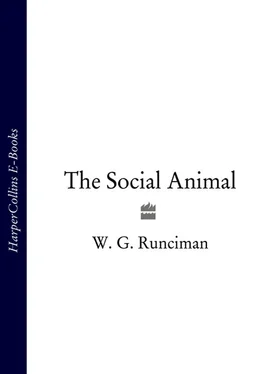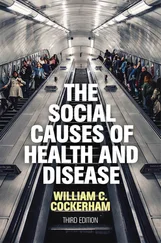With Marx, much of the difficulty (but at the same time, much of the reason for his influence) is his fusion of sociological with philosophical argument in precisely the way I had in mind in the concluding paragraphs of Chapter II. Literally thousands of books and articles have been written about the relationship between the ‘scientific’ and the ‘humanistic’ Marx. Nor is that surprising, given the enormous appeal of a doctrine combining a messianic prophecy of a better world with a hypothesis both supporting the prophecy and at the same time endorsing a revolutionary programme to make it come true. But he didn’t get it right. Marx’s belief that the course of human history is determined by conflict between a dominant class and a subordinate class which in due course replaces it led him to predict that the ‘proletariat’ would shortly displace the ‘bourgeoisie’ and usher in a utopian social order about whose details he was notoriously vague. But as a Polish joke was later to put it, ‘Under capitalism man exploits man; under socialism it’s the other way round.’ Marx’s sociology was mistaken in three ways. First, he was wrong in supposing that in capitalist industrial societies the progressive immiseration of an expanding proletariat would lead to a revolutionary transfer of power. Second, he was wrong in supposing that where socialist revolutions did come about, they would do so in industrial rather than still predominantly agricultural societies. Third, he was wrong in supposing that in socialist societies class conflict would come to an end. So why, you may well ask, is he still taken so seriously? The short answer is that he has made it impossible for any subsequent sociologist to look at the world and the human societies in it without conceding a more prominent part to class conflict and what he called the ‘social relations of production’ than had been admitted in pre-Marxist sociology. In that sense, and to that extent, ‘we are all Marxists now’.
Max Weber, who was born nearly half a century after Marx, disagreed with the Marxists not because he didn’t recognize the importance of class conflict in human history but because he denied that all other forms of conflict could be reduced to it. Not only did he see political as opposed to economic interests as having their own independent part to play, but he also gave to ideas, and particularly religious ideas, an importance which the Marxists denied them. Ideas, as he put it in a memorable phrase, are like switchmen diverting the course of history down one railway track rather than another. 2 His own view of history was as a process of inexorable ‘rationalization’ originating in the societies of early modern Europe. But, like Marx, he turns out not to have got it right. Whatever he meant by ‘rationalization’, it is not the inexorable process which he supposed – even though he saw it as being interrupted by the occasional emergence of a ‘charismatic’ religious or political leader – and it is not to Europe alone that the modern advance of science and technology is due. Yet Weber, too, has permanently influenced his successors. The best way for me to convey this is not to try and summarize his most enduring contributions, but simply to point out how often I mention him in this book. The eminent French sociologist Raymond Aron once said that Weber is not merely the greatest sociologist but the sociologist, 3 and it is hard to think of any other for whom the claim could plausibly be made.
And Durkheim? Durkheim was a near-contemporary of Weber’s (although, to the puzzlement of later historians of ideas, they never took any account of each other’s work). Unlike Weber, however, Durkheim sought to establish sociology as an autonomous subject by postulating a conceptual realm of the ‘social’ in which human institutions were all to be explained by reference to other ‘social facts’, these being defined as such by the ‘collective consciousness’ of the society in question. This extrapolation from the unquestionably valid observation that social behaviour is not simply a matter of individual choice has proved seductive to more anthropologists than sociologists, perhaps because of their stronger sense of the importance in human societies of custom and ritual. But it is flawed for a reason which Durkheim seems never to have grasped. If human social behaviour is explicable entirely by the social environment within which the persons whose behaviour it is have been brought up, then this must include the way they conceptualize their behaviour to themselves – an inference which Durkheim was, in fact, explicitly willing to draw. But the inference rests on a fallacy. For if, as Durkheim believed, even the concept of duality derives from a perception of dualities in the social organization of society, how can they be perceived to be dualities without some innate prior capacity for doing so? Quite apart from the findings of evolutionary psychology and biological anthropology, which have undermined the conception of the human mind as a blank slate on which society imprints what it may, there is a logical error here reminiscent of the old chestnut about the painter El Greco being astigmatic (work it out for yourself if you don’t know the answer already). In Durkheim’s last book, he went so far as to argue, by a sort of reverse-evolutionary study of the Australian Arunta, that all religion is essentially the worship of society by itself – as if much religious doctrine and practice weren’t explicitly hostile to the established institutions of the societies in which they have arisen on that very account. As Evans-Pritchard later remarked, it was Durkheim, not the ‘savage’, who turned Society into a God. 4
And yet, and yet. We are all to some degree Durkheimians now, just as we are all to some degree Weberians and Marxists. It’s not just that so many of Durkheim’s preoccupations are ours too: the division of labour in complex industrial societies, the psychological stress produced by social disequilibrium, the importance of associations intermediate between the individual and the state, or the relation between public education and private morality. It’s also that there is a sense in which societies and cultures are more than the sum of their members’ behaviour, and their members do tacitly acknowledge this in much of what they say and do. Look at how people participate in rituals of various kinds even when they are indifferent to the ideology purporting to legitimate them, or how they respond collectively and seemingly unthinkingly to patriotic symbols, or how they conform to social changes which are not of their own making. The correct explanation of these patterns of behaviour may be different from what Durkheim supposed. But he was right to see them as incompatible with the dogmatically individualist assumptions which he attributed to earlier economic and political theorists, the British ‘Utilitarians’ included. If, like Comte before him, he was to prove mistaken in undervaluing individual psychology, it doesn’t follow that he was wrong to deny that sociology is nothing more than individual psychology writ large.
Ironically, neither Marx nor Weber nor Durkheim were as influential in their lifetimes as the self-educated Victorian railway engineer Herbert Spencer; and since it was Spencer who actually coined the unfortunate phrase ‘survival of the fittest’, you may well wonder why I have left him off my list. But Spencer’s sociology was more irreparably flawed than Marx’s, Weber’s or Durkheim’s by his conception of evolution as a cosmic process of mechanistic advance towards a harmonious equilibrium and his simultaneous conviction that a scientific ethics could be derived from the laws of a uniform Nature. To be sure, for Marx class conflict was to lead to an eventual state of universal harmony, just as for Spencer individual competition was to do so. But Spencer’s appeal to his contemporaries, particularly in the United States, 5 derived less from the conviction carried by his account of universal human history than from the ostensibly scientific legitimation which he gave to unfettered competition in pursuit of personal gain. He was, of course, perfectly right to point out how strenuously individuals do compete with one another for personal gain (and not by any means only in the United States). But he failed to see how little that actually explains about why a given society’s economic, ideological and political institutions come to be what they are.
Читать дальше




![О Генри - Социальный треугольник [The Social Triangle]](/books/405340/o-genri-socialnyj-treugolnik-the-social-triangl-thumb.webp)







